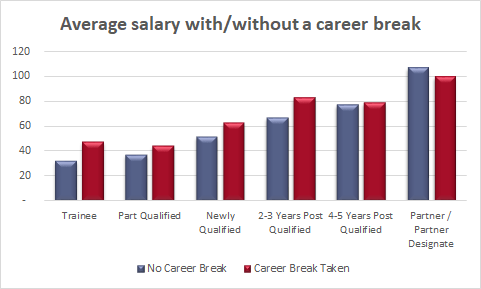Does taking a career break negatively impact your earning potential?
We at Fellows and Associates have just gone live with the data collection phase of our 7th annual salary survey and I thought I would delve a little deeper into something that has been nagging at me for some time. Does taking a career break negatively impact your earning potential?
We added the question of a “career break” into our 2017 survey for the first time and it is these results which I have analysed in more detail for the purposes of today’s question.
Now it may seem like the question will have an obvious answer as how could a hiatus in employment have a positive effect? Perhaps we’re all in for a surprise. Some may also think this relates solely to females given that even in this day and age of improved workplace equality and paternity rights it is still most frequently the “fairer” sex that tends to stay at home with the child(ren) for any period of time. Whilst it does bear out that of those that took a career break 70% were women, it is by no means restricted to woman alone, especially when we consider that career breaks can occur for many reasons. Unemployment, sabbaticals or other personal issues that could include mental health concerns or caring for loved ones may also require one to take time away from their career. In fact, only 45% of the career breaks were due to maternity leave.
One glance at these figures tells us that, overwhelmingly, no, a career break does not negatively impact one’s earning potential. Except perhaps at the highest levels, and even then, you may be able to argue that any differences could be down to any number of contributing factors. Have I read that right? Well that surprised me, if I’m honest. So, I looked at the data from different angles. Specialism and experience had no bearing on the outcome. Although there were one or two exceptions to the rule, those that had taken a career break fared better than their counterparts who had not taken one. Looking at it from a male / female perspective by experience, however, saw that half the time men were better off than women having taken a career break at the same point in their careers (part and newly qualified), whereas once they had a few years’ experience to Partner designate level then women having taken a career break outperformed the men that had taken one.
How could this be? Surely pausing your career would put you behind your peers that had not? Or is it that those that return from a career break do so refreshed, eager for mental stimulation following maternity leave or perhaps even with the desire to prove that any break taken simply has no bearing on their ability to perform? Is a welcome side effect of this extra effort, drive and determination a demonstrative increase in pay?
Given that high salaries rarely occur without the productivity and company profits to back them up perhaps there’s an argument to be made in favour of firms being more inclusive and encouraging career breaks?
If you have any thoughts on the matter please get in touch with me at [email protected] or if you would like to participate in this year’s survey please head to www.fellowssurvey.com before 3 June 2018.

